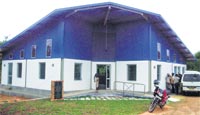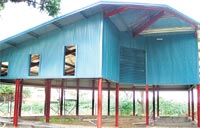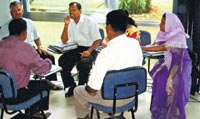|
No longer from pillar to post
By
Kumudini Hettiarachchi
Social Care Centres within easy
reach will act as one-stop shops at community level
to help with social and administrative problems.
From pillar to post and back again
from post to pillar. As anyone who has had to get any
work attended to at a government office would readily
testify, the plight of the Sri Lankan is that –
the infamous “file” is passed from desk
to desk and officer to officer, with the poor victims,
the public, that these officers are bound to serve,
go home disappointed, upset, angry and disgruntled.
In most cases, they leave empty-handed.
 |
| Centres at Panadura |
This scenario is about to change.
Whereas earlier, people had to waste precious hours
and days at Divisional Secretariats being shunted around,
now they can walk into ‘Social Care Centres’
located within their own areas, take up their problems,
grievances and needs with a multi-disciplinary team
and get them sorted out immediately.
 |
| Centres at Hambantota |
The trailblazing Social Care Centre
will be opened in Panadura this week on September 15,
followed by 27 others along the coastal belt from Panadura
to Jaffna, the areas affected by the tsunami, under
the first phase of a revolutionary project launched
by the Ministries of Social Services & Social Welfare
and Child Development & Women’s Empowerment.
The seed for this project, the ultimate
in decentralization, came about by chance. “I
was thinking about all the women who go abroad, especially
to the Middle East as housemaids, leaving behind a host
of problems……drunken husbands, sick children
or those with a disability, young daughters in danger
of being lured into incestuous relationships, elderly
parents. We train these women to use blenders and other
modern equipment but what happens in their home when
they go abroad? We have social service officers including
those involved in providing services to children, elders,
women and disabled and I wondered how all of them could
form a support network for those left behind by the
housemaids,” says Additional Secretary W.H.W.
Soysa of the Ministry of Social Services & Social
Welfare.
 |
| Some of the social service officers
attending a training session at SLFI |
This was about two years ago and Mr.
Soysa was looking specifically at Kurunegala, from where
there is a large exodus of women to the Middle East.
He bounced his idea off two dear friends, not officially
at first. They happened to be Ted Chaiban and Greg Deuly,
who were heading UNICEF and Save the Children, Sri Lanka
respectively at that time.
Delighted with the idea, they were
mulling over how all these officers could be utilized
to support the families of migrant workers more effectively,
when came the big waves of the tsunami, in the aftermath
of which aid poured in.
The seed took root, and with UNICEF
and Save the Children going 50-50, the project was launched.
“We will put up 28 Social Care Centres initially
and then another 32 in the tsunami-affected Divisional
Secretariat areas, all with funding from UNICEF and
Save the Children which have provided Rs. 1.5 million
not only for the construction of each centre but also
for equipment and furniture,” says Mr. Soysa.
In these centres, will sit all the
officers who will provide support and guidance to the
community at the basic level, dealing with simple but
important issues such as a problem with a child or a
parent, money for self-employment etc. This multi-disciplinary
team will comprise the Social Services Officer, the
Social Development Assistant, the Early Childhood Development
Assistant, the Probation Officer, the Child Rights Promotion
Officer, the Counsellor, the Elderly Development Officer
and the Women’s Development Officer.
In addition to looking after the social
needs of the families coming under their purview, the
centres will also facilitate the reduction of red tape
which bureaucrats are well-known for. The centres will
keep the various forms needed in the administration
of daily life connected to important events such as
births, retirement, and property sales and channel such
requests in the right direction.
While the project for the network of centres was on
the drawing boards, half a world away, in Canada to
be precise, a team at Queen’s University in Ontario
was contemplating how it could support Sri Lanka after
the tsunami.
Sri Lanka, like many other developing
countries was not “unchartered territory”
for this team from the International Centre for the
Advancement of Community Based Rehabilitation (ICACBR).
They had been frequent visitors, not as tourists, but
as groups helping with the integration of people with
disabilities to mainstream society and poverty reduction.
That was also the time when the Ministry
of Social Services & Social Welfare was looking
for help in the “governance” sphere, to
change the thinking and attitudes of the officers who
would be its “face” at the Social Care Centres.
The time was right and the match perfect.
The Queen’s University team, funded by the Canadian
International Development Agency, the aid arm of the
Canadian government, was in Sri Lanka to set in motion
a programme to train a core group of locals comprising
public officers and a few NGO representatives who would
then fan out across the country and train all officers
who would be installed at the Social Care Centres.
 |
| Djenana Jalovcic |
“Education is our business and
this project was just right,” says Djenana Jalovcic
who is heading the team.
Giving voice to the views of the team,
ICACBR Executive Director Malcolm Peat says that government
institutions in many countries have different officers
working at different levels, mostly in isolation. There
is no mechanism to bring them together for the benefit
of the community whom they are dealing with. The Social
Care Centres, however, will be a client-friendly “one-stop
shop” focusing on the client’s needs.
 |
| Malcolm Peat |
Usually, things are done “to”
people rather than “with” them. These centres
will move away from this attitude and be “community
or citizenship models” says Mr. Peat while team
member Lorna Jean Edmonds adds: “Although all
centres will have one overall goal, each one will reflect
the needs of the community where it is located. They
will be area-specific as they will deal with the community
directly.”
 |
| Debbie Docherty |
Having a disability herself, another
team member Debbie Docherty, a multiple sclerosis sufferer
who walks with a cane and uses a yellow scooter to take
her around, says Sri Lanka could develop the Social
Care Centres as a model for the whole of Asia. “It
is something exportable,” she stresses, adding
that if an elderly woman comes to the centre seeking
spectacles, there maybe another person at home who needs
a wheelchair. When the centre staff talks to her they
will be able to identify all her needs and also those
of her family.
Explaining that at the Social Care
Centres one family will have only one file, with a detailed
case study, making life easier not only for the family
but also for the authorities, Additional Secretary Soysa
sums up succinctly: “The centres will be one long
stride in our walk towards a caring society.”
|
